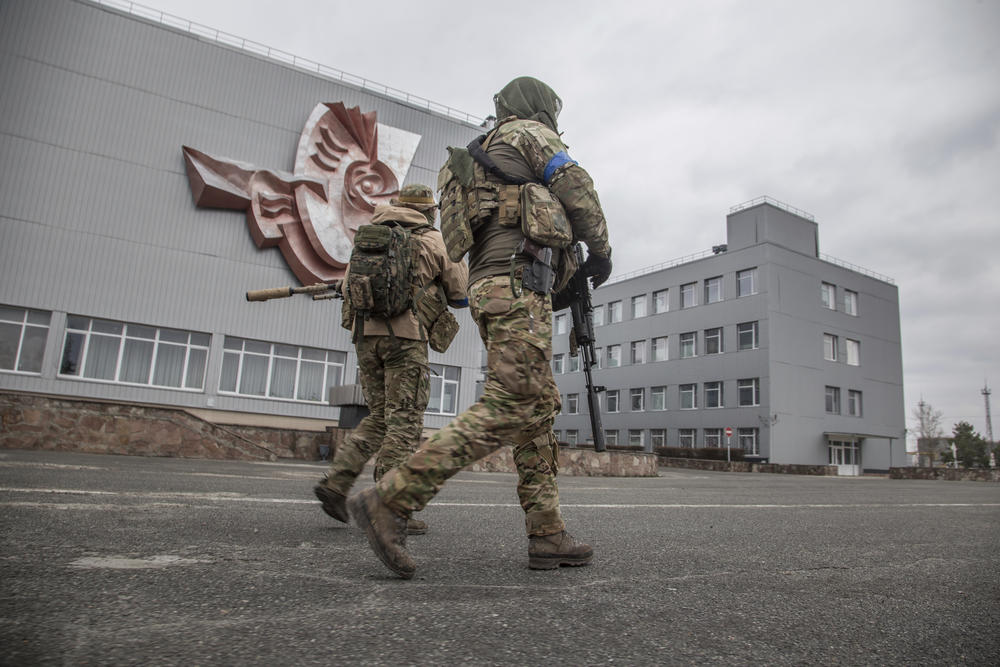Section Branding
Header Content
Satellite photo shows Russian troops were stationed in Chernobyl's radioactive zone
Primary Content
During its occupation of the Chernobyl nuclear site, Russia appears to have stationed troops in an area of high radioactive contamination, according to new satellite imagery obtained by NPR from the company Planet.
The decision raises the possibility that Russia exposed its own soldiers to potentially unhealthy levels of radioactivity during its month-plus possession of the defunct nuclear facility.
Experts say the levels are not nearly enough to cause sudden radiation poisoning, but they could potentially elevate the long-term risks of cancer for the soldiers.
"You shouldn't go into a contaminated site and have people camping out and digging in the dirt," says Kathryn Higley, a radiation health physicist at Oregon State University. While the risk of developing cancer in the long term remains "very, very low," she says it shows Russia's disregard for the well-being of its own troops.
A risky stopping place for troops
Chernobyl was the site of the world's worst nuclear disaster in 1986. A meltdown and explosion spewed radioactive material across the region, and fallout throughout Western Europe. Nearly 40 years after the accident, an exclusion zone — where people are prohibited from living or growing crops — remains in effect around the nuclear plant.
The satellite image shows an apparent Russian convoy and encampment in one of the more radioactive parts of the exclusion zone — on the edge of the so-called "red forest" — a region so contaminated by the nuclear meltdown that most of the trees died at the time. The image, dated from March 16, shows the convoy of around 30 vehicles parked on a stretch of road about 3.5 kilometers (2.2 miles) west of the ruined reactor. Nearby appears what looks like a small encampment, with berms, trenches for armored vehicles and a tent (location: 51.3892, 30.0479).
An image from March 28, days before Russia's withdrawal from Chernobyl and the surrounding exclusion zone, shows fires burning near the site of the encampment. A second image, from March 29, shows that the fire reached the camp and may have destroyed it before being extinguished.
Ukraine's state utility, Energatom, posted drone footage of the same site on its Telegram channel on April 6. That footage shows the charred area, along with the remains of what appear to be temporary buildings, as well as trenches and sandbag positions on the road.
The International Atomic Energy says that it is aware of the reports that Russian troops may have been exposed to radiation, but so far it has been unable to verify them.
"The IAEA has reviewed the footage but can only undertake an independent radiological assessment once its experts are on the site," the agency said in a statement on Thursday.
The exclusion zone around Chernobyl is subject to wildfires this time of year, and it remains unclear whether the fire was natural, a result of activities by Russian troops or deliberately started by someone else.
Russia seized Chernobyl in late February, and held the site for over a month.
Rumors of radioactive poisoning spread
Since the withdrawal of Russian forces on March 31, rumors have been circulating on social media that its troops at Chernobyl had fallen ill after digging trenches on the site. A post on a Belarusian Telegram channel that monitors troop activity inside the country showed military vehicles arriving at a hospital in the city of Gomel, which specializes in treating radiation.
NPR was able to identify the location of a photo in the Belarussian post as being taken at the hospital, but was not able to verify whether the vehicles or their passengers were Russian. The Telegram channel also noted that Russian troops are regularly seen at the facility.
The area in Chernobyl that was used by the Russian troops "is decently hot," according to Tim Mousseau, an ecologist at the University of South Carolina who's studied the Chernobyl exclusion zone for years.
But Mousseau and Higley both say that the troops couldn't have gotten radiation poisoning from living on the site, even for a month.
"It seems unlikely that a very large dose would be received from just sitting in the trenches," Mousseau told NPR via email. "A more likely scenario, based on having brought dozens of visitors to the zone with me over the years, is that there was a psychosomatic response to finding out that they were in a highly contaminated region."
Higley adds that the Russian soldiers may have been experiencing other health issues as well. "It could be stress, it could be cold, it could be bad food; all of those things can mimic the symptoms of radiation syndrome," she says.
Higley says that the decision to station forces in the forests around Chernobyl is "only one small bad thing on a list of a whole lot of other bad things" being done by Russia in Ukraine. Even the troops who slept there face far larger risks if they are redeployed to forward positions in eastern Ukraine, where Russia is reportedly sending reinforcements.
"In the grand scheme of things," she says, "I think a little bit of radiation risk from sleeping on the ground at Chernobyl is probably the least of their worries at this point."
Copyright 2022 NPR. To see more, visit https://www.npr.org.

